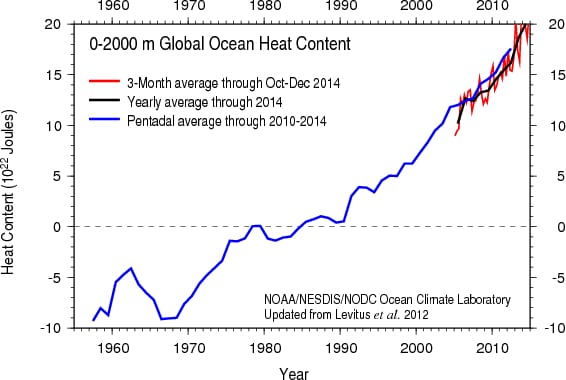The big climate news last week was NOAA and NASA announcing that 2014 was the hottest year on record, breaking the highs of 2005 and 2010. But the bigger story got buried: Global warming has continued unabated in recent years.
Indeed, it’s not just that there not been a hiatus or pause or even slowdown in surface temperature warming (see below). The oceans, where the vast majority of human-caused global warming heat goes, have seen an acceleration in warming in recent years. As climate expert Prof. John Abraham writes in the UK Guardian, “The oceans are warming so fast, they keep breaking scientists’ charts.”
 Remember, more than 90 percent of human induced planetary warming goes into the oceans, while only 2 percent goes into the atmosphere, so small changes in ocean uptake can have huge impact on surface temperatures. That’s a key reason surface temperatures haven’t appeared to warm as fast as many had expected in the past ten years — although ocean warming has sped up, and sea level rise has accelerated more than we thought , and Arctic sea ice has melted much faster than the models expected, as have the great ice sheets in Greenland and Antarctica
Remember, more than 90 percent of human induced planetary warming goes into the oceans, while only 2 percent goes into the atmosphere, so small changes in ocean uptake can have huge impact on surface temperatures. That’s a key reason surface temperatures haven’t appeared to warm as fast as many had expected in the past ten years — although ocean warming has sped up, and sea level rise has accelerated more than we thought , and Arctic sea ice has melted much faster than the models expected, as have the great ice sheets in Greenland and Antarctica
But here’s where the media’s sometimes single-minded focus on one statistic — the hottest year on record — misses the real story from the latest scientific data and analysis. The human-caused rise in surface air temperatures never paused, never even slowed significantly. And that means we are likely headed toward a period of rapid surface temperature warming. Here’s why.
Dr. Gavin Schmidt, director of NASA’s Goddard Institute of Space Studies, tweeted last week “Is there evidence that there is a significant change of trend from 1998? (Spoiler: No.)” He attached this chart, which uses NASA’s latest data:

If the media can finally stop missing the forest for the trees, if they can stop missing the blatantly obvious warming trend everywhere scientists said we would see it because they only stare at a very narrow set of (generally misinterpreted) data, then they should stop repeating the myth of a hiatus or even of a global warming slowdown once and for all.
In fact, the next big story may well be that surface warming starts accelerating soon. As the lead author of one 2014 study said:
“Scientists have long suspected that extra ocean heat uptake has slowed the rise of global average temperatures, but the mechanism behind the hiatus remained unclear…. But the heat uptake is by no means permanent: when the trade wind strength returns to normal –- as it inevitably will –- our research suggests heat will quickly accumulate in the atmosphere. So global [surface] temperatures look set to rise rapidly….”
And that, combined with the current record ocean temperatures — and faster than expected warming of the ocean’s surface layer — means we can expect a continuation of the unexpectedly fast loss of Arctic sea ice and of land-locked ice in Greenland and Antarctica. And we should anticipate even more record-smashing extreme weather than we’ve had in recent years, as we throw more fuel into the an already supercharged atmosphere.
Source: Climate Progress. Reproduced with permission.







